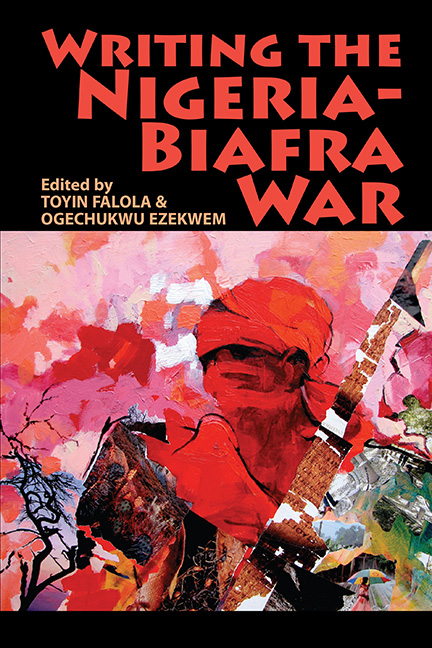Book contents
- Frontmatter
- Contents
- Notes on Contributors
- List of Abbreviations
- Timeline
- Map of Biafra 30 May 1967 – 1 May 1969
- 1 Scholarly Trends, Issues, and Themes: Introduction
- Part I On The History Of The Nigeria-Biafra War
- Part II Critical Debates On The Nigerian Crisis
- Part III The War In Fiction, Memoir, And Imagination
- Part IV Locating Gender In Nigeria-Biafra War Literature
- Select Bibliography
- Index
11 - ‘War is War’: Recreating the Dreams and Nightmares of the Nigeria-Biafra War through the Eyes of Ken Saro-Wiwa’s Sozaboy
Published online by Cambridge University Press: 17 June 2021
- Frontmatter
- Contents
- Notes on Contributors
- List of Abbreviations
- Timeline
- Map of Biafra 30 May 1967 – 1 May 1969
- 1 Scholarly Trends, Issues, and Themes: Introduction
- Part I On The History Of The Nigeria-Biafra War
- Part II Critical Debates On The Nigerian Crisis
- Part III The War In Fiction, Memoir, And Imagination
- Part IV Locating Gender In Nigeria-Biafra War Literature
- Select Bibliography
- Index
Summary
Introduction
This chapter posits that the historiography of the Nigeria-Biafra War has been characterized by a few ‘blind spots’. This comes to the fore when examining the ways the war has been deployed by scholars analysing the role and place of ethnic minorities located in the oil-rich parts of Eastern Region. These ethnic minorities’ territory became the object and terrain of war between a secessionist Biafra and the Federal Government of Nigeria. During the Nigeria-Biafra War, the ethnic minorities of the oil-producing Niger Delta were ‘caught in the crossfire’, torn between Ojukwu's declaration of Biafra's independence and a historic opportunity to achieve the age-old quest for ethnic minority rights and self-determination. It was an ambition driven by the determination to end perceived domination by the numerically predominant Igbo ethnic group of the Eastern Region. It was also buoyed by the creation of three new states in 1967 by the Federal Military Government for ethnic minorities in the Niger Delta, thus freeing them from the hegemony of the Eastern Region, which was dominated by Igbo elites. The creation of Rivers and South-Eastern states out of the former Eastern Region (and the creation of the new Mid-West State out of the old Mid-West Region) also encouraged some ethnic minority elites from the Niger Delta to support the federal side when the civil war broke out in 1967.
While most accounts of the Nigeria-Biafra War have focused on its causes, specific events, and roles of various actors on both sides in the war (secessionist Biafra and the Federal Government of Nigeria), they have either glossed over or ignored the ways in which the war divided previously united and harmonious communities and people. In many cases, they have failed to capture the complex ways in which the war created a space for some individuals to change sides, trade places, and opportunistically take advantage of a war that simultaneously enriched the few and decimated the impoverished and vulnerable majority trapped in war-ravaged Biafran territory. By the same token, a lot of the war literature has either been dominated by the works of professional historians or consist of a plethora of war accounts written by a range of actors, particularly military officers and politicians.
- Type
- Chapter
- Information
- Writing the Nigeria-Biafra War , pp. 230 - 244Publisher: Boydell & BrewerPrint publication year: 2016



